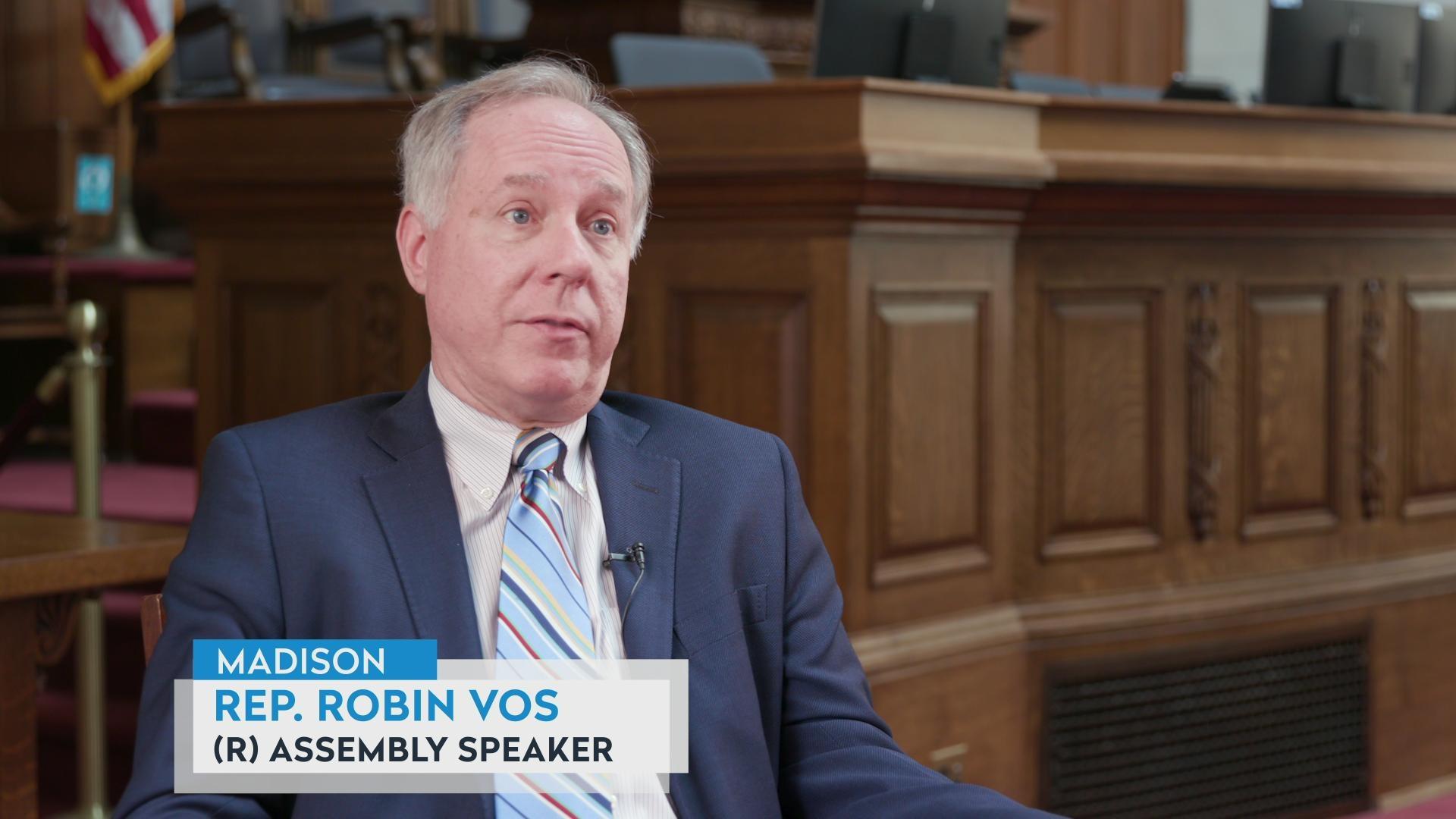Frederica Freyberg:
This week, new reporting revealed that Foxconn may not have manufacturing in mind for its promised $10 billion Racine County campus. A flurry of denials, assurances and blame-casting ensued until finally, at week’s end, a statement today from the company that it will manufacture LCD screens in Racine, after all.
Reuters first broke the story, saying the Taiwanese tech giant is no longer planning to hire a blue color workforce but instead will mostly hire engineers and researchers. The company already missed the mark on its first pledge for jobs in 2018, thereby missing out on a round of tax incentives. Foxconn Technology Group said in a statement, We remain committed to the Wisconn Valley Science and Technology Park project, the creation of 13,000 jobs and to our long-term investment in Wisconsin. As our plans are driven by those of our customers, this has necessitated the adjustment of plans for all projects, including Wisconsin.” But Wisconsin Republicans aren’t blaming Foxconn for changing course. They’re blaming the new governor, Tony Evers. A joint statement released by Assembly Speaker Robin Vos and Senate Majority Leader Scott Fitzgerald said “We don’t blame Foxconn for altering plans in an ever-changing technology business. It’s also not surprising Foxconn would rethink building a manufacturing plant in Wisconsin under the Evers’ administration. The company is reacting to the wave of economic uncertainty that the new governor has brought with his administration.” All of this unfolding throughout the week. And then by this afternoon, Foxconn was back on the books, pledging to move ahead with plans to manufacture LCD screens at the Racine County facility. In a statement saying, After a personal conversation between President Donald J. Trump and Chairman Terry Gou, Foxconn is moving forward with our planned construction of a Gen 6 fab facility. This campus will serve both as an advanced manufacturing facility as well as a hub of high-technology innovation for the region.”
We asked the CEO of the Wisconsin Economic Development Corporation for an interview. WEDC referred us to Tim Sheehy. He’s President of the Metropolitan Milwaukee Association of Commerce. He joins us now from Milwaukee and thanks very much for being here.
Tim Sheehy:
Thank you for having me.
Frederica Freyberg:
So as for the reporting that said that Foxconn no longer had manufacturing in mind for its Racine County plant, you say you have spoken directly to the company and they dispute that. What did they tell you?
Tim Sheehy:
Well, this is an evolving story, and people are jumping to conclusions rather quickly. Clearly market forces have affected some of the decisions that they’re making. But what they’ve told us is they’re committed to manufacturing in Wisconsin. They’re determining what type of technology they’re going to make here. And that this is more than just a manufacturing campus. It’s going to include research, design, prototyping and other sorts of work. So I want people just to hold back a little bit and not treat this like a political football. This is a serious investment by a serious company and I think it’s going to play out.
Frederica Freyberg:
In fact, Foxconn says it remains committed to the 13,000 jobs promised. But as you’ve just discussed, the mix is more kind of engineering jobs and fewer plant floor jobs. Does the 13,000 number include spin-offs, to your knowledge?
Tim Sheehy:
The 13,000 jobs, according to the contract which Foxconn is complying with, are direct employees of Foxconn. It does not include any spin-off effect from the employment that would occur over the next 15 years with Foxconn.
Frederica Freyberg:
What does the contract say about whether the engineers and design jobs have to be filled with Wisconsin talent?
Tim Sheehy:
Well, what the contract says and what the Legislative Reference Bureau just confirmed is that the employees that Foxconn gets credit for need to be in Wisconsin. They need to be Wisconsin taxpayers. And I believe that is the process that Foxconn is following if they’re going to get credit under the contract.
Frederica Freyberg:
Now, Foxconn has erected a 120,000 square foot building on the Racine County site. A Japanese news outlet, as you know, says the company is suspending work on that $10 billion plant. What do you know about that?
Tim Sheehy:
Well, this is the same Japanese news outlet that also said that Governor Walker had a number of side deals and that Governor Evers was reneging on those side deals. I know for a fact neither of those two pieces of information are true. So Im suspicious of the information that Foxconn is suspending the development of the plant.
Frederica Freyberg:
Foxconn did not tell you anything about suspending operations?
Tim Sheehy:
No. What Foxconn has said to me and what they’ve said publicly is that due to changes in market forces, they’re reviewing the kind of technology they’re going to manufacture, not whether they’re going to manufacture it.
Frederica Freyberg:
Now, Republican legislative leaders, as you know, have blamed Governor Tony Evers for whatever is happening now with Foxconn. What’s your response to that?
Tim Sheehy:
Its another kick at the political football. Through this process, the Democrats hung this on Governor Walker as a project that was going to fail and now in reverse when there’s a hiccup, we’ve got the Republican leadership blaming a Democratic governor. So again, I want to stay focused on the business of this prospect, not on the political nature of it.
Frederica Freyberg:
Speaking of the business of it, Foxconn has committed $100 million to UW-Madison. How firm is that commitment?
Tim Sheehy:
Well, that’s something between Foxconn and UW, but they’ve made the commitment there. They’ve also committed to a $100 million venture fund. They’ve bought buildings in downtown Milwaukee, Eau Claire and Green Bay. So those are all firm agreements from my perspective.
Frederica Freyberg:
So overall you are still bullish on Foxconn in Wisconsin?
Tim Sheehy:
Im bullish on Foxconn in Wisconsin, recognizing that market forces do impact business plans.
Frederica Freyberg:
All right. Tim Sheehy, thanks very much for joining us.
Tim Sheehy:
Youre welcome.
Frederica Freyberg:
We move from a believer of Foxconn to a critic. Assembly Minority Leader Gordon Hintz joins us from Oshkosh. He’s also a new member of the Wisconsin Economic Development Corporation. Thanks for being here.
Gordon Hintz:
Happy to be here.
Frederica Freyberg:
Foxconn persists in knocking down and disputing stories about dropping manufacturing in Racine or suspending work there on the plant. What do you make of those assurances and any others that might be forthcoming?
Gordon Hintz:
All I know is 18 months ago, we debated a plan with Foxconn where taxpayers were being asked to assume a lot of risk to construct LCD panels, large screen. It would be manufacturing jobs. A month later that changed. The types of jobs have changed. And the word of Foxconn hasn’t really been good in Wisconsin and their track record around the country hasn’t been good, either.
Frederica Freyberg:
Republican leaders blame Governor Tony Evers for whatever might be happening with Foxconn. What’s your reaction to that?
Gordon Hintz:
Well, Foxconn said that they simply can’t compete with labor costs in the United States, not just Wisconsin. But if I had spent 18 months cheerleading a project that was supposed to transform Wisconsin’s economy and bring 13,000 jobs, only to get an announcement that maybe nothing is happening, Id be pretty embarrassed, too. So I think they’re trying to deflect blame and spin rather than try to be held accountable for what was a reckless decision.
Frederica Freyberg:
You decry the risk Wisconsin took on this deal. For his part, former Governor Scott Walker tweeted this this week. “Foxconn earns state tax credits based on actual investment and job creation. No jobs/investment, no credits, period.” The message being we don’t lose money on the deal if original promises are not kept. What about that?
Gordon Hintz:
Well try telling that to the taxpayers of Mt. Pleasant and Racine County. Try telling that to the taxpayers around the state where we’ve diverted $135 million of transportation money away from statewide projects to build local roads for Foxconn. Not to mention the fact that the state spent two years as this as their economic development focus getting away from potential other things. So there’s opportunity costs there as well. I think anytime you over-promise and under-perform, the taxpayers start to lose trust in government.
Frederica Freyberg:
You recently appointed yourself to the board of the Wisconsin Economic Development Corporation which oversees the contract with Foxconn. What are you looking to do in that role?
Gordon Hintz:
Well, we’re here. We have a contract on Foxconn. To me, the biggest thing that’s hurt the entire project has been the lack of transparency and accountability. 18 months later, we have no idea what they’re talking about, what a technology hub even means, what an innovation center is. We don’t even know what the 178 people supposedly working here are doing. And so I think if we are going to have something smaller in scale, in research and development, we need some answers from the company that we can understand so we know that whatever investment we’re asked to put in this for our taxpayers as a worthwhile one is protected. I’m here to make sure we have accountability and transparency.
Frederica Freyberg:
Meanwhile some Republicans blame Democrats for rooting against Foxconn. Are you among them?
Gordon Hintz:
No. I mean, I certainly thought this was a bad deal from the start. I pretty much said everything, questioned the market viability. A lot of our predictions have come true. Again, this was a specific project. The 13,000 jobs were based on the manufacturing of large panel screens. That’s not happening anymore. That didn’t stop Republicans and Governor Walker and Foxconn from continuing to throw those numbers out there even though they weren’t tied to anything. So not rooting against anything, but trying to hold this project accountable. We have an obligation to protect taxpayers, but also to make sure that whatever investment we are making is meaningful over the long term so we get good value for our investment.
Frederica Freyberg:
All right. We leave it there. Representative Gordon Hintz, thanks very much for joining us.
Gordon Hintz:
Thanks for having me.
Search Episodes
News Stories from PBS Wisconsin

Donate to sign up. Activate and sign in to Passport. It's that easy to help PBS Wisconsin serve your community through media that educates, inspires, and entertains.
Make your membership gift today
Only for new users: Activate Passport using your code or email address
Already a member?
Look up my account
Need some help? Go to FAQ or visit PBS Passport Help
Need help accessing PBS Wisconsin anywhere?

Online Access | Platform & Device Access | Cable or Satellite Access | Over-The-Air Access
Visit Access Guide
Need help accessing PBS Wisconsin anywhere?

Visit Our
Live TV Access Guide
Online AccessPlatform & Device Access
Cable or Satellite Access
Over-The-Air Access
Visit Access Guide
 Passport
Passport


















Follow Us